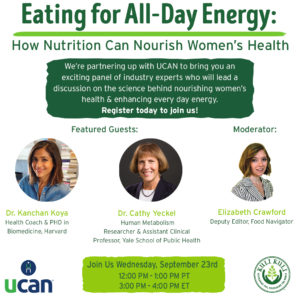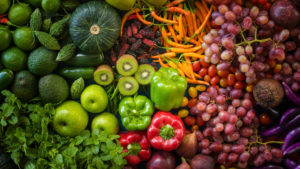How do nutritional choices affect your mood, wellness, and energy? What are a few myths around eating for overall energy? We partnered with UCAN for a webinar featuring biomedicine and human metabolism experts for a discussion on women’s health and energy.
Elizabeth Crawford of Food Navigator USA moderated an insightful panel featuring health coach and biomedicine expert Dr. Kanchan Koya, and human metabolism researcher Dr. Cathy Yeckel.
If you missed the webinar, Eating for All-Day Energy: How Nutrition Can Nourish Women’s Health, you can watch it by clicking the link, or watching it below. We’ll provide a quick summary in this article too.
3 Takeaways from our Eating for All-Day Energy Webinar
We hope this discussion offered insight into how to enhance overall energy and long-term health. Nourishing the body with nutrient-dense foods is a great start. There is a lot to deal with right now, and women often face pressure to “do it all,” as Elizabeth Crawford addresses early on in the panel.
What is the link between nutrition, health, and immunity? What if women had the permission and ability to slow down and take care of themselves? Enjoy the summary and let us know your thoughts in the comments below!
1) Eating the Spectrum of Healthy Foods Is Better than a “Quick Fix”
The intersection of health, food, and metabolism draws Dr. Yeckel to her work, especially the links between metabolism and health. When it comes to eating a balanced diet amidst Covid-19, Dr. Yeckel emphasizes that there isn’t a “quick fix” when it comes to nutrition.
“We have this wonderful potential that’s starting to get people interested in nutrition and health, but we also have this risk aside, that everyone wants the magic bullet,” Dr. Yeckel explains. “We have this whole spectrum of foods and ingredients that can start to nourish us.”
It makes sense that consumers looked for “solution-focused” foods featuring “immunity” benefits during the “frantic pantry-loading days,” as Elizabeth Crawford expresses; however, the real wholeness and health comes from a longer-term
2) “Back to the Basics” Can Be a Powerful Blueprint
After a stint in the Biopharma industry, Kanchan decided to leverage her expertise in science and love of food. Dr. Koya is a “food as medicine” practitioner, and also the creator of the platform Spice Spice Baby, as well as the Spice Spice Baby Cookbook.
A lot of trendy food options are exciting, Dr. Koya explains in this webinar, but they can overshadow the long history of certain foods that have always been known for their nutritional benefits.
“Let’s look at combinations of population studies, molecular studies, lab studies, animal studies, and let’s come up with a very simple blueprint for how we should eat to start.” After that, Dr. Koya recommends adding those superfoods—carefully and thoughtfully.
3) Foods That Help Us Unwind Are Just as Important As “Energy” Foods
“Unwinding can be difficult in the best of times,” Elizabeth Crawford says. Dr. Koya adds how crucial sleep is, especially for overall health and repair within the body.
What do you eat or drink before you ready for bed, starting about three hours before bedtime? Dr. Koya discusses how alcohol disrupts the sleep cycle, which of course impacts energy, cravings, and metabolic health the next day. “As much as I love a glass of wine, I really like to caution people who are using it routinely, to pay attention to that link between alcohol and sleep.”
What other questions do you have for overall energy and nutrition? You can watch our webinar below for more about eating for all-day energy and women’s health. Feel free to share with anyone who also inspires you, and leave a comment below!
For more webinar recaps, be sure to checkout Carbon Neutrality Amidst Covid-19, Quarantine Cooking, and How to Build a Climate-Smart and Ethical Business.
What do you think about the “back to basics” model of overall health and nutrition? Let us know your thoughts or questions below!
Follow us @kulikulifoods to learn more about our nutrient-dense moringa.










Thank you so much for all this good information, especially the spices and low intestines care. I have tried over the past year to incorporate more spices in my meal preparation. I also included bitter melon in my diet. My most recent A1C has decreased from above 7.1 to a wonderful 5.3. my doctor was amazed. So was I! I do drink cinnamon water often.
Hi how many teaspoons of morninga powder is best to take for anaemia in perimenopause?
HOW CAN NUTRITION NOURISH MEN’S HEALTH? THANKS